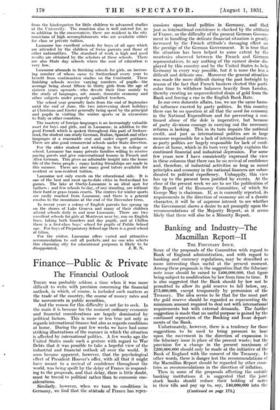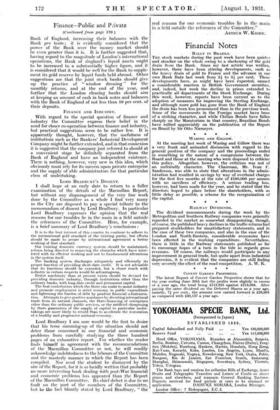Banking and Industry—The Macmillan Report—II
THE FIDUCIARY ISSUE.
S031E of the proposals of the Committee with regard to Bank of England administration, and with regard to banking and currency regulations, may be described as more interesting than useful at the present moment. Among these proposals is the suggestion that the fiduciary note issue should be raised to £400,000,000, that figure being subject to modification by law from time to time. It is also suggested that the Bank should by law not be permitted to allow its gold reserve to fall below, say, 175,000,000, except temporarily by permission of the Treasury. The idea seems to be that for the most part the gold reserve should be regarded as representing the minimum amount required to deal not with international requirements but with external demands. The further suggestion is made that no useful purpose is gained by the continued separation of the Banking and Issue depart- ments of the Bank.
Unfortunately, however, there is a tendency for these suggestions to be used to bring pressure to bear upon the movement in the direction of expansion in the fiduciary issue in place of the present waste; but the provision for a change in the present maximum of £260,000,000 should only be made at the initiative of the Bank of England with the consent of the Treasury. In other words, there is danger lest the recommendations of the Macmillan Report should be regarded by other coun- tries as recommendations in the direction of inflation.
Then in some of the proposals affecting -the- outside banking institutions it is suggested that the joint stock banks should reduce their holding of notes in their tills and pay up to, say, £40,000,000 into the (Continued on page 172.)
Finance—Public and Private
(Continued from page 170 ) Bank of England, increasing their balances with the Bank pro tanto ; it is evidently considered that the power of the Bank over the money market should be even greater than it is. It is further suggested that, having regard to the magnitude of London's international operations, the Bank of England's liquid assets ought to be increased to a substantially higher figure, and it is considered that it would be well for the Bank to supple- ment its gold reserve by liquid funds held abroad. Other suggestions • are that the joint stock banks should give up the practice of " window dressing " for the monthly returns, and at the end of the year, and further that the London clearing banks • should aim at, keeping an amount of cash in bank notes and balances with the Bank of England of not less than 10 per cent. of their deposits.



































 Previous page
Previous page